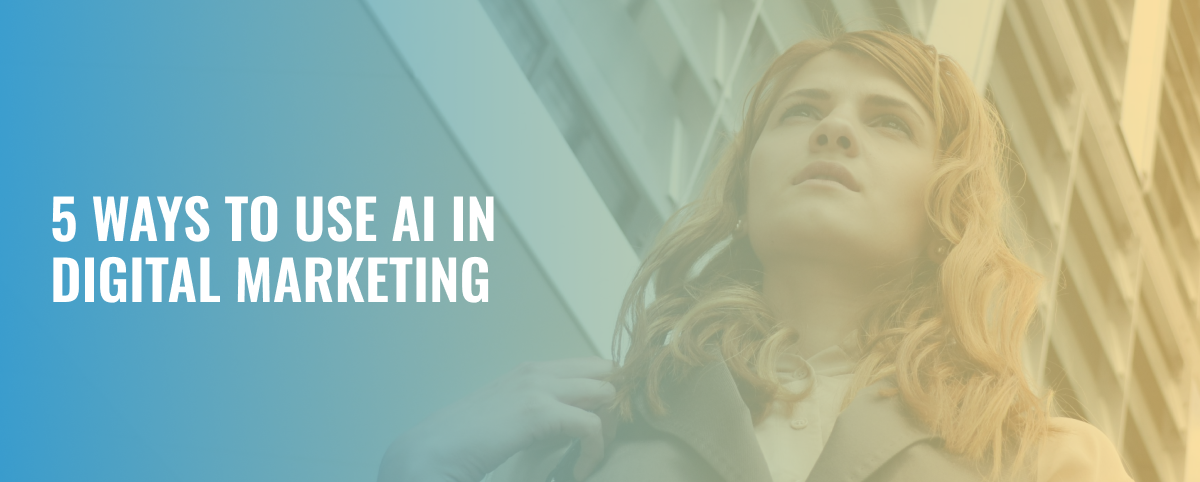8 minute read
5 Ways to Use AI in Digital Marketing
5 WAYS TO USE AI FOR YOUR DIGITAL MARKETING EFFORTS
In today’s dynamic and ever-changing digital landscape, companies must constantly look for ways to stay ahead of the competition. A powerful tool that has revolutionized the world of marketing is artificial intelligence (AI). Artificial intelligence is not just a buzzword, but a breakthrough technology that offers companies countless opportunities to improve their digital marketing efforts. Thanks to the ability to analyze huge amounts of data and make autonomous decisions, AI can significantly increase the effectiveness and efficiency of digital campaigns. In this article, we discuss five innovative ways companies can leverage the power of AI in their digital marketing strategies. We’ll dive deeper into the role AI plays in generating better customer insights, improving personalization, optimizing ad campaigns, and improving overall ROI. Additionally, we will explore how AI can be used to develop effective content strategies and improve the user experience of your website. By harnessing the power of AI, companies can gain valuable insights, make data-driven decisions, and ultimately increase the effectiveness of their digital marketing efforts.
How to Utilize AI to Improve Digital Marketing Efforts
AI in digital marketing is a revolutionary method to optimize marketing and branding efforts. Incorporating AI into digital marketing strategies enables the collection and analysis of large amounts of data, leading to a better understanding of consumer behavior. This data can be used to create personalized and targeted marketing campaigns, increasing your chances of reaching and engaging with potential customers.
AI can also automate various tasks, such as social media management, content creation, and ad optimization, freeing up valuable time for marketers to focus on strategic and creative efforts. AI-based tools can provide real-time insights and predictions, allowing marketers to make data-driven decisions and adjust campaigns accordingly. In this way, AI not only increases the efficiency and effectiveness of digital marketing efforts, but also ensures that businesses deliver the right message to the right audience at the right time.
5 Powerful Ways to Leverage AI in Marketing
By leveraging AI, marketers can achieve unprecedented levels of precision, efficiency, and personalization. Here are five powerful ways to harness AI in digital marketing:
-
AI-ENHANCED LEAD MANAGEMENT
AI-enhanced lead management transforms the traditional approach to handling potential customers. By utilizing AI algorithms, marketers can efficiently analyze vast amounts of data to identify high-quality leads, predict customer behavior, and prioritize outreach efforts. AI systems can track and interpret user interactions across various touchpoints, providing insights into a lead’s readiness to convert. For instance, AI tools can analyze a prospect’s online behavior, such as website visits, content consumption, and social media engagement, to score leads and tailor follow-up actions accordingly. This not only increases the efficiency of the sales team, but also significantly boosts conversion rates by ensuring that the right message reaches the right person at the right time.
-
AI-DRIVEN A/B TESTING FOR PRECISION
AI-driven A/B testing for precision takes the guesswork out of optimizing marketing campaigns. Traditional A/B testing can be time-consuming and limited in scope, often relying on simple comparisons between two versions of a marketing asset. However, AI can simultaneously test multiple variables and analyze the results in real-time, providing marketers with actionable insights faster and with greater accuracy. By using machine learning algorithms, AI can identify the most effective combinations of headlines, images, calls to action, and other elements, enabling marketers to refine their strategies with precision. This approach not only saves time, but also ensures that marketing efforts are consistently optimized for the best possible outcomes.
-
AI-POWERED BUDGET OPTIMIZATION
AI-powered budget optimization helps marketers allocate their resources more effectively. Managing a digital marketing budget involves making numerous decisions about where to spend money to achieve the highest return on investment (ROI). AI can analyze historical data, current market trends, and campaign performance to recommend optimal budget allocations. For example, AI tools can predict which channels and strategies are likely to yield the best results based on past performance and real-time data. This allows marketers to dynamically adjust their spending, ensuring that every dollar is used efficiently. By continuously learning and adapting, AI-powered budget optimization ensures that marketing budgets are always aligned with the most promising opportunities.
-
AI-ENHANCED AD DESIGN OPTIMIZATION
AI-powered ad design optimization enables the creation of more compelling and effective advertisements. Crafting an ad that resonates with the target audience requires a deep understanding of their preferences and behaviors. AI can analyze data from previous ad campaigns, social media interactions, and customer feedback to identify patterns and preferences. Using this information, AI can suggest design elements, copy, and layouts that are likely to perform well. Additionally, AI can automate the creation of multiple ad variations, testing them across different segments to determine which versions drive the most engagement. This level of optimization ensures that ads are not only visually appealing, but also highly relevant to the audience, thereby increasing their impact and effectiveness.
-
CREATING IMMERSIVE CUSTOMER EXPERIENCES WITH AI
Creating immersive customer experiences with AI is transforming the way brands interact with their customers. AI technologies such as chatbots, virtual assistants, and augmented reality (AR) are enhancing customer engagement by providing personalized and interactive experiences. Chatbots, powered by natural language processing (NLP), can handle customer inquiries, provide product recommendations, and assist with transactions around the clock, offering a seamless and responsive customer service experience. Virtual assistants can guide users through complex processes, such as product configuration or troubleshooting, making the customer journey more intuitive and enjoyable. Meanwhile, AR can be used to create immersive shopping experiences, allowing customers to visualize products in their own environment before making a purchase. These AI-driven experiences not only enhance customer satisfaction, but also foster stronger emotional connections with the brand.
Strategies for Maximizing AI Effectiveness in Digital Marketing
As technology evolves, the role of artificial intelligence in digital marketing is becoming more and more important in achieving optimal results. Here are some key strategies for maximizing the effectiveness of AI in digital marketing. First, artificial intelligence can be used to collect and analyze large amounts of data in real time. This data can provide valuable information about customer behavior, preferences, and needs. By using AI-based tools, companies can better understand their target audience, allowing them to tailor their marketing campaigns accordingly. For example, artificial intelligence algorithms can analyze consumer data to identify patterns and trends, which can then be used to create personalized and highly targeted marketing messages. This can lead to increased engagement and conversions, resulting in a more effective and efficient marketing strategy.
Additionally, AI can help automate many tasks that were previously done manually, freeing marketers to focus on high-level strategies. For example, AI-powered chatbots can handle customer inquiries, recommend products, and even process transactions. This not only saves marketers time, but also improves the customer experience by ensuring quick and effective responses. AI can optimize ad placement and targeting by analyzing user data and targeting ads to the right audience at the right time. This maximizes the effectiveness of digital marketing campaigns and helps companies achieve their desired goals.
Another effective strategy for maximizing the effectiveness of AI in digital marketing is to constantly monitor and improve AI algorithms. Like any technology, AI requires regular maintenance and updates to ensure optimal performance. This involves analyzing data and adapting algorithms accordingly to improve accuracy and efficiency. By continuously monitoring and refining AI algorithms, companies can ensure that their marketing strategies remain effective and relevant in an ever-changing digital landscape.
In short, the integration of artificial intelligence with digital marketing has revolutionized the way companies reach and interact with their target audiences. By leveraging the power of artificial intelligence to collect and analyze data, automate tasks, and continuously refine algorithms, companies can maximize the effectiveness of their digital marketing strategies. With the help of AI, marketers can gain valuable insights, save time, and optimize their campaigns for better results, ultimately leading to greater customer satisfaction and business success.
How do I Choose the Best AI Tools?
With the ability to analyze large amounts of data and make predictions, artificial intelligence has radically changed the way companies approach their marketing strategies. However, with the plethora of AI tools available in the market, choosing the right one for your digital marketing efforts can be a difficult task. Here are some key considerations that can help you choose the best AI tools for your business.
First of all, it is necessary to assess your business needs and goals. Whether it’s lead generation, customer segmentation, or personalized communications, identifying your specific requirements will help you narrow down your search for the best AI tool.
Secondly, it is important to research and compare the different AI tools available in the market. Look for reviews and case studies on how these tools have been used by other companies and what their success rates are. You should also consider the pricing models and features of the tools to see which one best suits your budget and requirements.
Additionally, consider the scalability and integration capabilities of AI tools. As your business grows, you want to make sure the AI tool you choose can adapt and scale to meet your changing needs. Integration with existing systems and platforms is also essential for the smooth implementation of marketing strategies.
Finally, it is extremely important to choose a reputable and recognized AI tool provider. Look for tools that have been tried and tested by other reputable companies and have a history of delivering results. Additionally, make sure your AI tool provider provides your team with the appropriate support and training to maximize the tool’s potential.
Conclusion
Artificial intelligence has become an essential digital marketing tool, offering a wide range of benefits to both businesses and marketers. Using artificial intelligence, companies can improve customer service, optimize campaigns, improve data analysis, personalize content, and increase productivity. With the continuous development and integration of artificial intelligence in digital marketing, the possibilities of its use are endless. As the digital landscape continues to evolve, incorporating artificial intelligence into your marketing strategies is crucial to staying ahead of the competition and achieving success in the ever-changing online world. So don’t wait any longer, start leveraging the power of AI in your digital marketing efforts today and see the transformative impact it can have on your business.

